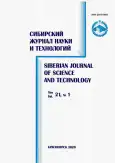Peculiarities of design software architecture of adaptive information processing, modeling and control systems
- Authors: Raskina A.V.1, Videnin S.A.1, Chzhan E.A.1, Yusupova R.R.1
-
Affiliations:
- Siberian Federal University
- Issue: Vol 21, No 1 (2020)
- Pages: 21-27
- Section: Section 1. Computer Science, Computer Engineering and Management
- Published: 25.03.2020
- URL: https://journals.eco-vector.com/2712-8970/article/view/562980
- DOI: https://doi.org/10.31772/2587-6066-2020-21-1-21-27
- ID: 562980
Cite item
Full Text
Abstract
The article proposes an approach to developing the architecture of a service-oriented information processing system, modeling and process control. The system, which is being developed, is a tool for identifying, predicting and controlling discrete-continuous processes. Its mathematical apparatus is based on nonparametric algorithms of identification and control. The software architecture includes the following main modules: the module for processing data, modeling and forecasting output process variables and the process control module. The first module includes data preprocessing algorithms: normalization, centering and analysis of outliers and omissions. The modeling module is an algorithm for research and recovery dependencies between process variables, process identification using nonparametric estimation of the regression function from observations. The last module is an implementation of nonparametric dual control algorithms. Control devices built on the basis of these algorithms perform functions of both object control and its study.
The article discusses the application of architectural solutions based on two proven approaches in the field of software development: the composite approach and the service- oriented approach.. The main principles of composite architecture as a set of software systems with many characteristics that perform a specific task and service-oriented architecture as a modular approach to software development are described. The advantages of the applied composite service-oriented architecture over other variants of software architecture for control systems are shown, in particular, monolithic software architecture is compared with composite service-oriented architecture. This means that a researcher can use a single operation, which is a logically isolated, repeated task related to the production process of the enterprise. At the same time, it is necessary to ensure positive results when integrating with existing software products of enterprises which greatly complicates and requires the development of new components, as well as support for the "inherited" parts of the system.
About the authors
Anastasia V. Raskina
Siberian Federal University
Author for correspondence.
Email: raskina.1012@yandex.ru
Cand. Sc., associate professor of Department of Information Systems, School of Space and Information Technology
Russian Federation, 79, Svobodnyy Av., Krasnoyarsk, 660041Sergey A. Videnin
Siberian Federal University
Email: videninserg@mail.ru
Cand. Sc., associate professor of Department of Information Systems, School of Space and Information Technology
Russian Federation, 79, Svobodnyy Av., Krasnoyarsk, 660041Ekaterina A. Chzhan
Siberian Federal University
Email: ekach@list.ru
Cand. Sc., associate professor of Department of Intelligent Control Systems, School of Space and Information Technology
Russian Federation, 79, Svobodnyy Av., Krasnoyarsk, 660041Ramilya R. Yusupova
Siberian Federal University
Email: sr.eagleowl@gmail.com
student, School of Space and Information Technology
Russian Federation, 79, Svobodnyy Av., Krasnoyarsk, 660041References
- Levine W. S. et al. Control system advanced methods. – Boca Raton, FL: CRC press, 2011, 50 p.
- Hovakimyan N., Cao C. Adaptive Control Theory: Guaranteed Robustness with Fast Adaptation. Society for Industrial and Applied Mathematics, 2010.
- Jianling Q., Guang M. Design of glass furnace control system based on model-free adaptive controller. Second International Conference on Computer Modeling and Simulation. IEEE, 2010, Vol. 4, P. 130–133.
- Eren-Oruklu M. et al. Adaptive system identification for estimating future glucose concentrations and hypoglycemia alarms. Automatica. 2012, Vol. 48, No. 8,
- P. 1892–1897.
- Wu L., Qiu X., Guo Y. A simplified adaptive feedback active noise control system. Applied Acoustics. 2014, Vol. 81, P. 40–46.
- Medvedev A. V. Osnovy teorii adaptivnyh system [Basic theory of adaptive systems]. Krasnoyarsk, SibGAU Publ., 2015, 525 p.
- Medvedev A. V. [The theory of nonparametric systems. Simulation]. Vestnik SibGAU. 2010, Vol. 4 (30), P. 4–9 (In Russ.).
- Raskina A. V. [Determination of the structure of a linear dynamic object in nonparametric identification problems]. Vestnik SibGAU. 2016, Vol. 4, P. 891–896
- (In Russ.).
- Bannikova A. V. Medvedev A. V. [On objects with memory management in a non-parametric uncertainty]. Vestnik SibGAU. 2014, Vol. 5(57), P. 26–37
- (In Russ.).
- Raskina A. V. Neparametricheskie algoritmy identifikacii i dual'nogo upravleniya dinamicheskimi ob"ektami. Dokt. Diss. [Nonparametric algorithms
- of identification and dual control of dynamic objects. Doct. Diss.]. Krasnoyarsk, 2018, 122 p.
- Nadaraja Je. A. Neparametricheskie ocenki plotnosti verojatnosti i krivoj regressii [Nonparametric estimation of probability density and the regression curve]. Tbilisi, 1983, 194 p.
- Fel'dbaum A. A. Osnovy teorii optimal'nyh avtomaticheskih system [Fundamentals of the theory of optimal automatic systems]. Moscow, Fizmatgiz Publ., 1963, 552 p.
- SOA in the Real World. Available at: http://www.microsoft.com/en-us/download/details.aspx? id=16187 (accessed 20.12.2019).
- Northrop L. Software Product Lines Essentials. Pittsburg: SEI Carnegie Mellon University, 2008, 85 p.
- Videnin S. A., Kostyuk A. V., Vasil'ev E. V. [Service-oriented architecture in modern information systems]. Sovremennye nauchnye issledovaniya i innovacii. 2016, Vol. 7. P. 121–123 (In Russ.).
Supplementary files










